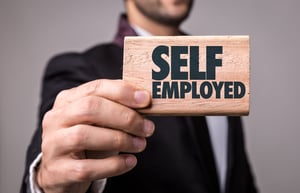
Many people start their own businesses, and many people have owned their own businesses for years. These self-employed individuals have found a way to provide a service or product and make a living, not only for themselves, but for others as well. However, when it comes to buying a home, entrepreneurs, business owners, and self-employed borrowers have a slightly different mortgage process. Due to the fact that more factors are at play than traditional salaried or hourly employees, lenders will want additional and diverse income information before approving a mortgage loan. Here is everything you need to know, as a self-employed borrower, in order to acquire a mortgage for the purchase of a home.
Are You Actually Considered Self-Employed?
If you own more than 25% of a business, or work as an independent contractor your lender will consider you as “self-employed”. This is also true for people that receive a 1099 as opposed to a W-2. Self-employed individuals may need to provide additional proof of income as they don’t receive a traditional, guaranteed salary or rate of pay. Financial institutions will want to ensure that your business is stable, with enough cash flow, to make your ability to pay the monthly note possible, even in a slow month.
What is Required to Obtain a Mortgage as a Self-Employed Individual?
As a business owner there are some specific things that a mortgage lender will need to confirm about your income and the organization of your business. First, your income stability needs to be confirmed by seeing consistent and respectable payments. Secondly, aside from your income, your lender will need to ensure that your business is financially sound and is positioned to stay profitable and grow in the future. Confirming how long that you’ve been self-employed is the third item that your lender will need. Typically at least two years of tax returns showing your self-employed income will be sufficient.
What Documents Do You Need to Prove Your Self-Employed Income for a Mortgage?
First and foremost, as with any mortgage, your lender will want to see your two most recent personal tax returns, along with any W2s and Schedule K1s. These documents represent your ability to maintain a steady earnings capability. Being self-employed, they’ll also like to have access to your two most recent business tax returns as well if you own more than 25% of the business. This allows the underwriting department to understand how your business is structured. Based on the type of business that you own and how it is organized, different documentation may be required. For self-employed individuals, lenders need to feel confident that the business is doing well and that any fluctuations in your income won’t affect your ability to make your monthly payments.
Furthermore, P&L (profit and loss) statements, IRS transcripts, and CPA letters may also be requested. Additionally, if you are using funds from a business account to pay for the down payment and closing costs, documentation that sources the funds will be needed. A letter from your CPA or tax lawyer will be required that confirms the removal of these funds from the business account will not negatively impact your business.
The expert staff of mortgage loan officers at Standard Mortgage are here to help you purchase or refinance your home. For over 90 years Standard Mortgage (NMLS#:44912) has been helping homeowners and home buyers find the perfect financing solution for their needs.





